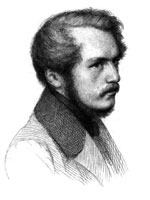
Welcome to Hyperion Records, an independent British classical label devoted to presenting high-quality recordings of music of all styles and from all periods from the twelfth century to the twenty-first.
Hyperion offers both CDs, and downloads in a number of formats. The site is also available in several languages.
Please use the dropdown buttons to set your preferred options, or use the checkbox to accept the defaults.

In search of a cure for his eyes Reinick went to Italy in 1838 and returned in 1841. He married in 1844 and moved to Dresden—thus at more or less the same time as Robert and Clara Schumann—and spent the rest of his life in that town. During this time he published one of his most famous books for children—Illustriertes ABC-Buch (1845). From this year he came into regular contact with Schumann and became a close family friend. Schumann never set any more Reinick after 1840 but for a time in 1846 there was a talk of co-opting the poet as a librettist for Schumann’s opera Genoveva—based on Hebbel and Tieck. Schumann came to regard Reinick as an unsuitable collaborator for this project, complaining of his ‘Umständlichkeit’ or ‘long-windedess’. On a personal level the friendship seemed to have prospered with Reinick invited to be godfather to Schumann’s second son Ludwig in 1848. When the Schumanns left Dresden in 1850 Reinick penned an ornate (and yes, long-winded) poetic ode for the parting ceremony; it is clear from these words that he revered Schumann and idolized Clara in particular as a ‘fairy of sound’. There is no sign in this late work of the pithier lyrics that had made him a favourite of the lieder composers. Reinick did not long outlive the Schumanns move to Düsseldorf—the town where the poet-painter had done some of his best work. He died in Dresden on 17 February 1852—a few days before his forty-seventh birthday. Later literary evaluations have not been particularly kind to Reinick but a side of his poetry—that which hymned a timeless life on the banks of the Rhine informed by a gentle German nationalism, and the power of marital love—clearly appealed greatly to many song composers in the closing years of the Biedermeier age.
from notes by Graham Johnson ©




